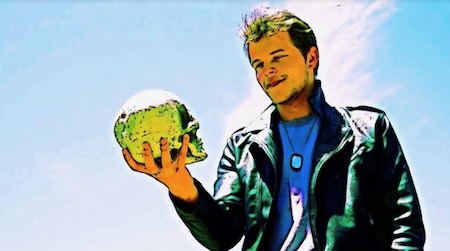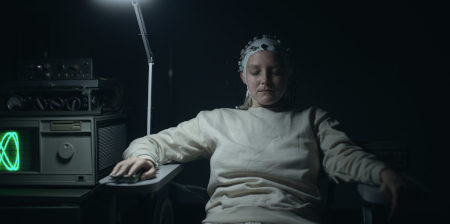366 Weird Movies may earn commissions from purchases made through product links.
DIRECTED BY: Ansel Faraj
FEATURING: Ethan Walker, Kelly Erin Decker, Nathan Wilson, David Selby
PLOT: Todd Tarantula’s prized motorcycle is stolen; more disconcertingly, he keeps slipping through time.

WHY IT MIGHT MAKE THE APOCRYPHA: Todd Tarantula renders L.A. in neon-sparked hues, a surreal effect heightened by the underlying grit of the smog-soaked city. The slippery narrative coursing beneath the death-candy visuals touches on ancient Pueblo lore, modern ennui, technological immortality, and a pleasing finish that is fairly rare in our corner of cinema. Also, there’s a skull-headlight time-travel motorbike.
COMMENTS:
I can’t tell if this is blood or snot! Can somebody help?
The scene is set with efficiency, because for Ansel Faraj, time is of the essence. This pressing speed is somewhat ironic when one considers that the protagonist, ne’er-do-well business scion Todd Tarantula, has time on his side. Well, more accurately, he has time at his disposal. This stubbled James Dean stand-in has his share of troubles—deceased mother, estranged father, dead-end life—but at least hehas a bitchin’ bike: his treasured means of escape from the demons that pursue him. But over the course of an evening, he loses that, and considerably more.
Tell me one—just one dream—that’s all I ask.
Rotoscoping is a wondrous technique, creating what is possibly the uncanniest of valleys. Grafting animation on to filmed reality anchors us in form and flow, while allowing unfettered tinkering. Faraj’s peripheral tinkering is limited, for the most part, to a glorious color skew. Murky nights shift from green to black. Dazzling sun-lit cityscapes become a Technicolor kaleidoscope. Negative space morphs into clingy radiance. When Todd finally encounters his father, the wire-and-bandage-wrapped patriarch appears as a tethered angel amidst his array of hospital machines and plastic draping. During a car ride with Lucifer (a business rival of his father), the power of animation emphasizes Todd’s claustrophobia and draws the eye to the old gentleman’s skull-topped cane, hinting at the unspoken cost of the business deal playing at the tip of Lucifer’s tongue.
News of death travels fast; dare I say, ‘I’m sorry’?
Ansel Faraj’s film is not perfect. The performances are inconsistent, and the narrative thread sometimes veers too far from the main stitching. However, he has an interesting story to tell here, and it is told entertainingly, with many clever bursts. When he learns of his father’s demise, and the deceased’s disrupted attempt to achieve digital immortality, Todd is idling at the La Brea Tarpits—site of others who have failed to achieve a favorable form of perpetuity.
I don’t know what’s real any more, and I’m really fucking tired of it.
As events unfold (and, in some cases, re-fold), Todd Tarantula slows its pace, drawing everything together at the end for a finish that some will consider a touch too trite. I, on the other hand, was pleased, and relieved to see something pleasant and astounding befall this troubled bohemian nomad. Todd Tarantula sears the eyes, bends the mind, and has the good manners to elicit a satisfied grin.
Todd Tarantula is currently streaming free on Tubi.
WHAT THE CRITICS SAY:





